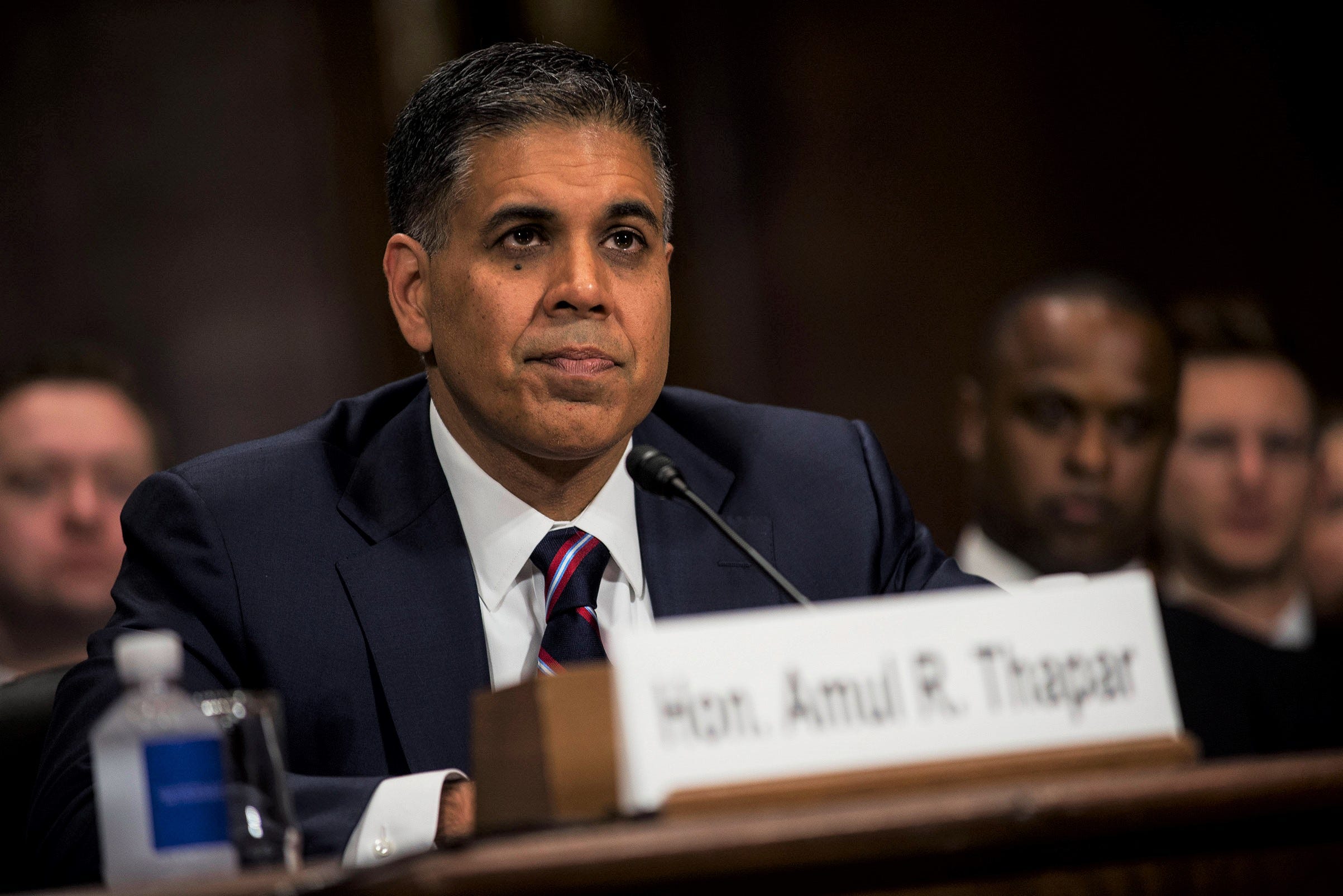Amul Roger Thapar, a judge on the U.S. Court of Appeals for the 6th Circuit, has emerged as one of several top contenders to replace the late Justice Ruth Bader Ginsburg on the Supreme Court, according to multiple reports.
If chosen, Thapar would be the first Asian American formally nominated to serve on the nation’s highest court. He previously made history during the Bush administration as the country’s first federal court judge of South Asian descent.
Ginsburg, a legal giant and fierce advocate for gender equality, died on Friday at the age of 87 after a longtime battle with pancreatic cancer. Her passing kicked off an immediate firestorm after President Donald Trump and senior Republican lawmakers made clear they intended to potentially confirm a replacement before the November election.
Thapar has been on Trump’s shortlist for a Supreme Court nomination twice prior, and within 24 hours of Ginsburg’s death, his name was in headlines again.
While President Trump said on Saturday that he planned to nominate a woman as Ginsburg’s successor, his commitment to the plan is unclear. Thapar has not been ruled out as of publishing time.
The White House vetted him as a possible replacement during the vacancy left by the death of Justice Antonin Scalia. Thapar was also among four finalists that President Trump personally interviewed for the high court in 2018 after the retirement of Anthony Kennedy—before he eventually settled on Brett Kavanaugh.
Thapar, a darling of the Federalist Society, is said to be favored by Senate Majority Leader Mitch McConnell (R-Kentucky) and has an edge due to his strong conservative judicial record and upbringing in two key swing states.
A meteoric rise
Thapar, 51, was born to Indian immigrants in Detroit, Michigan and grew up in Toledo, Ohio. He graduated from Boston College in 1991 and attained a law degree from the University of California, Berkeley School of Law in 1994, according to the Federal Judicial Center. Before his tenure as a judge, he worked in private practice, at one point volunteering to represent the Becket Fund for Religious Liberty pro bono, and served as prosecutor for the Eastern District of Kentucky from 2006 to 2007.
An assistant U.S. Attorney from 2002 to 2006, he served on the Attorney General’s Advisory Committee (AGAC) and chaired the AGAC’s Controlled Substances and Asset Forfeiture subcommittee. He was also a member of its Terrorism and National Security subcommittee, Violent Crime subcommittee, and Child Exploitation working group. He is a strong proponent of the separation of powers.
Thapar has navigated the Senate confirmation three times before, according to Bloomberg Law. In his most recent role as President Trump’s first lower court nominee, Thapar was confirmed by a 52–44 vote in May 2017—becoming the second South Asian judge to serve on a federal circuit court.
As a judge, Thapar has decided a number of immigration cases. In 2015, he rejected a motion to dismiss a charge of resisting deportation; the case involved a noncitizen who came to the U.S. from Ghana on a student visa but did not enroll in classes.
Thapar deferred to the Board of Immigration Appeals (BIA) in another 2015 ruling, maintaining that no exemption from deportation applied if a noncitizen convicted of a crime is not taken into custody immediately after their release from prison. He did note that other courts have made different decisions. In 2017, Thapar was part of a 6th Circuit panel that upheld a decision by the BIA to deny a Salvadoran woman’s asylum claim.
Thapar has also weighed in on other critical cases. He both granted and denied qualified immunity to police officers, and liberal advocacy groups previously blasted him for a 2016 decision where he struck down a prohibition on judges making political contributions—which was later partially overturned.
The path forward
If President Trump taps Thapar in a bid to cement the Supreme Court’s conservative tilt for a generation—either to replace Ginsburg or another justice in the future—the move would put the longtime NAPABA member under intense scrutiny, though he enjoys strong support from influential Republicans and Asian American legal groups.
McConnell, who will be tasked with securing the votes for a potential Supreme Court nominee, called Thapar a “friend” at his 2017 confirmation hearing.
“He has a reputation as a qualified judge with an impressive legal mind,” McConnell told POLITICO after Thapar was confirmed. “He will fairly apply the law to all who enter his courtroom because, in Judge Thapar’s own words, ‘the most important attribute of a judge is to be open-minded and not to prejudge a case without reading the briefs, researching the law, and hearing from the parties.’”
Thapar also has deep ties to the National Asian American Pacific American Bar Association, which has repeatedly praised him, provided testimony in support of his 2017 nomination, and previously lobbied for his inclusion on President Trump’s first Supreme Court shortlist. Thapar was among five individuals to receive the 2015 Daniel K. Inouye Trailblazers Awards, NAPABA’s highest honor.
NAPABA did not respond to The Yappie’s request for comment, but the organization has said that Thapar’s “qualifications, integrity, intellect, and commitment to the justice system are unquestionable.”
Thapar has faced questions from Democratic lawmakers about his links to the Federalist Society and The Heritage Foundation, a conservative D.C. think tank. Following his inclusion on the first SCOTUS shortlist, Thapar told the Senate Judiciary Committee that he had no allegiance to either organization. “I’m my own judge, and I hope my track record speaks to that,” he said.


Indian-Americans for President Trump (IAFPT), a former political action committee that threw support behind the president in 2016, said the organization is excited by the possibility of an Indian American Supreme Court justice.
“Love it if Thapar is nominated, because he has all the conservative values and qualifications for the Supreme Court bench,” Dave Makkar, an IAFPT spokesman, told The Yappie on Saturday. “If nominated he will certainly make a history and proud moment for Indian-American community. Personally realistically speaking, there is a strong movement building up for women!”
South Asians for Biden, a grassroots Democratic group dedicated to mobilizing the South Asian community, was quick to emphasize Ginsburg’s wish for the presidential election winner to nominate her replacement.
“South Asians for Biden vehemently condemns President Trump’s and Leader McConnell’s indecorous rush to appoint a replacement, and their obviously craven election ploy to float names of potential justices that are women or minorities,” Communications Director Deepa Sharma said in a statement.
Beyond Thapar, Trump has other Asian Americans to choose from. Texas judge James Ho and former U.S. Solicitor General Noel Francisco were included on a revamped list of possible Supreme Court picks released by the White House earlier this month. NAPABA has submitted letters of support for both of them.









